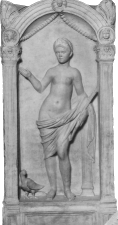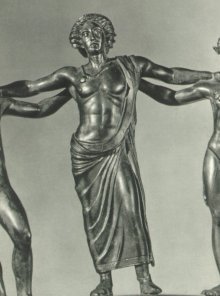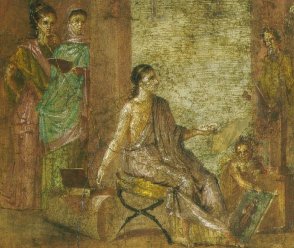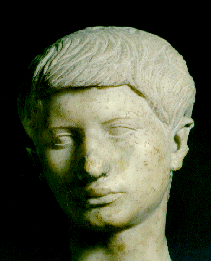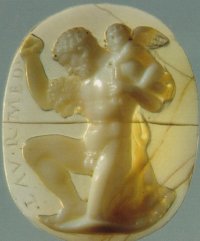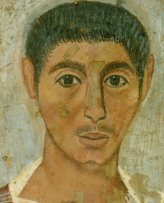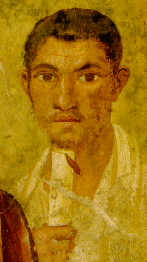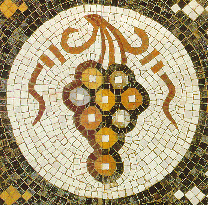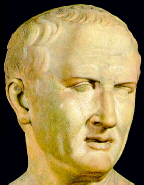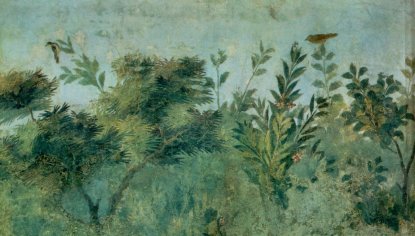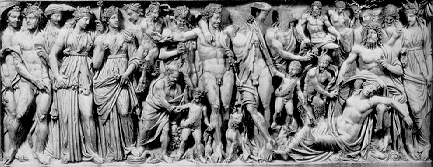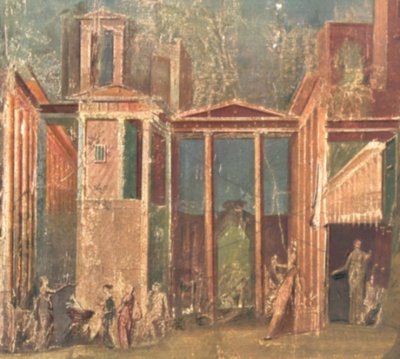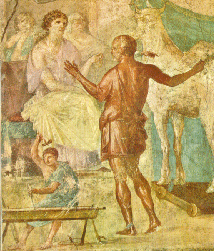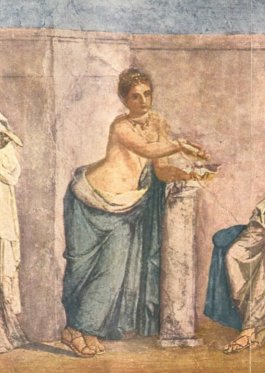
 This day (NP), is for
special religious observance. This day (NP), is for
special religious observance.
 This day is sacred
to Ops Consivia, or the earth-goddess, is associated with the god Consus,
but is considered to be the wife of Saturn. The shrine to Ops Consivia
was located in the Regia and on this day the Vestal Virgins would have
opened the room of sacred objects and performed rites unknown. The purpose
of the rites was to ensure the fertility of the earth. This day is sacred
to Ops Consivia, or the earth-goddess, is associated with the god Consus,
but is considered to be the wife of Saturn. The shrine to Ops Consivia
was located in the Regia and on this day the Vestal Virgins would have
opened the room of sacred objects and performed rites unknown. The purpose
of the rites was to ensure the fertility of the earth.
 The Council of Nicea,
in Greece, met this day in 325 and decided which books would form the
Gospels and the New Testament, and which gospels and books would be
excluded or destroyed. Among the losers were the Gospel of Thomas and
the mystic revelation of John. The Gospel of Thomas, although containing
the complete spoken words of Jesus and predating the other four gospels,
made no mention of any miracles -- as if they had never happened. The
Christians needed miracles to prove their claim that Jesus was actually
the son of God, and so the Gospel of Thomas was discredited and destroyed.
Two partial copies survived and were found buried in the Israeli desert
in the 1940s. In spite of many objections, the council of Nicea voted
to add the Torah and several selected books of the Old Testament to
the newly named Bible, so as to give it the appearance of authenticity. The Council of Nicea,
in Greece, met this day in 325 and decided which books would form the
Gospels and the New Testament, and which gospels and books would be
excluded or destroyed. Among the losers were the Gospel of Thomas and
the mystic revelation of John. The Gospel of Thomas, although containing
the complete spoken words of Jesus and predating the other four gospels,
made no mention of any miracles -- as if they had never happened. The
Christians needed miracles to prove their claim that Jesus was actually
the son of God, and so the Gospel of Thomas was discredited and destroyed.
Two partial copies survived and were found buried in the Israeli desert
in the 1940s. In spite of many objections, the council of Nicea voted
to add the Torah and several selected books of the Old Testament to
the newly named Bible, so as to give it the appearance of authenticity.
 The Vandal Stilicho,
who controlled the forces of the Western Roman empire was murdered this
day in 408 AD. The Vandal Stilicho,
who controlled the forces of the Western Roman empire was murdered this
day in 408 AD.
 The sack of Rome by
the Visigoths continued for a third day today in 410 AD. When the rape
and pillage was over a baggage train of spoils and enslaved Romans 10
miles long left Rome and headed north. The sack of Rome by
the Visigoths continued for a third day today in 410 AD. When the rape
and pillage was over a baggage train of spoils and enslaved Romans 10
miles long left Rome and headed north.
 August was originally
called Sextilis, or the sixth month (after March). It was renamed in
honor of Augustus Caesar, the most revered of the Roman August was originally
called Sextilis, or the sixth month (after March). It was renamed in
honor of Augustus Caesar, the most revered of the Roman
 In Egypt, this day was
the Nativity of Horus. Horus was son of the earth god Geb and the sky
goddess Nut, and the brother of Isis. In Egypt, this day was
the Nativity of Horus. Horus was son of the earth god Geb and the sky
goddess Nut, and the brother of Isis.
|
 |

